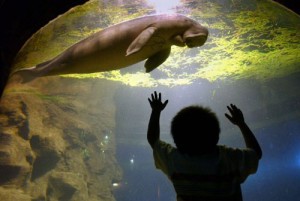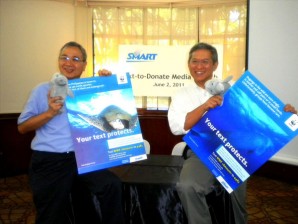WWF-Philippines and Smart launch ‘Text-to-Donate’ campaign

Saving rare animals like the ‘dugong’ (sea sow) all over the country through WWF-Smart’s ‘Text-to-Donate’ service. AFP file photo/CHOO Youn-Kong
MANILA, Philippines—A simple text can save the Philippine ‘dugong’ (sea cow) and green sea turtle.
This is what the World Wide Fund for Nature Philippines (WWF-Philippines), together with Smart Communications Inc., wants to accomplish as they urge the public to help save rare animals all over the country through their ‘Text-to-Donate’ service.
“(The) Philippines has been the text capital of the world… (with) two and a half billion text messages sent every day in the country. So, text message as a means to donate will provide busy people (the chance to) be online volunteers,” explained Ramon Isberto, Smart Communications Public Affairs Group Head.
The SMS-based donation platform, launched Thursday, will allow 46 million Smart and Talk ‘N Text subscribers to help save the two endangered animals through WWF’s wildlife conservation programs.
With the use of their text-to-donate campaign, Smart and Talk ‘N Text subscribers now can make a one-time donation to WWF ranging from P5 to P1000. Interested Smart and Talk ‘N Text subscribers need to type WWF to 4483. Valid values were 5, 10, 25, 50, 100, 500 and 1,000, said Isberto.
Article continues after this advertisementSubscribers may also text WWF ON to 4483 to give regular P5 donation that will be deducted, or billed to the user every 20 days, he added.
Article continues after this advertisement“It is something worthwhile and easy to do and the amounts don’t hurt pockets very much,” Isberto quipped.
Calling the campaign a “simple arrangement,” Isberto said that “social engineering is difficult. You can’t expect people to donate just because (the program) is available.” He said that the real work would be getting the public to accept the project as something ‘worthwhile’ and make them feel “connected to the advocacy.”

Ramon R. Isberto, Smart Communications Public Affairs Group Head and World Wildlife Fund Philippines (WWF-Ph) CEO and Vice Chairman Lorenzo Tan posed for the launching of “Text-to-Donate”, a partnership of Smart and WWF-PH to encourage citizens save dugongs and sea turtles in Davao Gulf.
Isberto said that they would be disseminating information about the project through text messages to Smart and Talk ‘N Text subscribers who have agreed to receive notifications. He said that they have roughly a million subscribers to send the information to.
Funds generated through this campaign will go to the rehabilitation and preservation of the Davao Gulf, home to most marine species in the country, said WWF-Ph CEO and Vice Chairman Lorenzo Tan.
“The aim is not only to save the animals but their habitat (as well),” said Tan, adding that WWF-Philippines has worked in the Davao Gulf for 12 years through cooperative ventures with the Davao Gulf Management Council and the Save Davao Gulf Foundation.
WWF-Ph and Smart has worked together since last year in a project that aims to develop education modules advocating energy efficiency and conservation in selected schools, said Tan.
“Our goal is not just to raise money, but to build a community and constituency,” Isberto added.
“Five out of seven sea turtle species in the world can be found in our country, and two of them are already endangered,” WWF-Philippines Communications and Media officer Gregg Yan said.
Estimating the number of dugongs in the country to be in the hundreds, Tan said that the status of the rare animal was relatively unknown. “Hundreds may be in the Philippines, but in many areas, they are (being) hunted and eaten.”
Isberto revealed that Smart has also been helping the save the Davao Gulf by partnering with private and government agencies to create a device which will measure the fish density, water salinity, among others.
“We are developing a device to monitor what’s happening in the water of Davao Gulf so it was very easy for us to say yes to this project,” he stated.